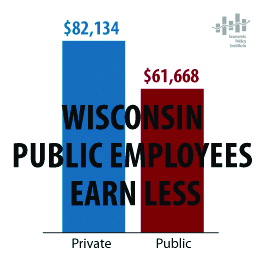Underbelly of the pension crisis

This data clearly shows that the private sector employee makes more than cops, firefighters and teachers.
(Editor’s note: This is a really good, well written analysis of the pension issue. Johnson sets the record straight that most pensions are well funded and that public employees are not over paid nor are their benefits the cause of the problem.)
by Rob Johnson
Excerpts from the article: Since the beginning of the Great Recession, policymakers and reporters have spoken of a growing crisis in public pensions. Many state and local governments are struggling to meet their obligations to retirees, and the easiest explanation is that government workers are overpaid and their pensions are unaffordable.
But the evidence suggests that the pensions crisis is both less pervasive and more complex than that. Beyond the economic crisis, which put enormous pressure on state and municipal budgets, a range of factors including poor decision-making and the influence of big money interests has led to the underfunding of some state and city public pensions. With a clearer understanding of the problem, we can begin to take steps to solve it and keep our promises to public workers.
Contrary to public perception, pension underfunding is not a widespread issue. There is wide variation in pension performance across states, and underfunding is concentrated in particular states (for example, Illinois and Kentucky) and cities (Chicago and Providence). Where underfunding does occur, it seems to stem largely from the internal problems of those governments, which existed well before the recent economic crisis put additional pressure on their budgets.
There is also little basis for the conclusion that state and local employees are significantly overcompensated. On the contrary, pay is comparable at lower skill levels, and private-sector employees are significantly better paid at higher skill levels.
The pensions crisis has far-reaching implications for the future of the U.S. economy: the state and local government sector is about 14 percent of the American workforce. Failure to uphold the promises we’ve made to current workers and retirees would create a brain drain in the public sector, drive down private-sector wages, exacerbate inequality, and lead to more economic volatility. These problems can be solved, but it will require substantial reform and swift and collective action.
This article was originally published on Next New Deal. It is adapted from the author’s forthcoming paper on the public pensions crisis.














